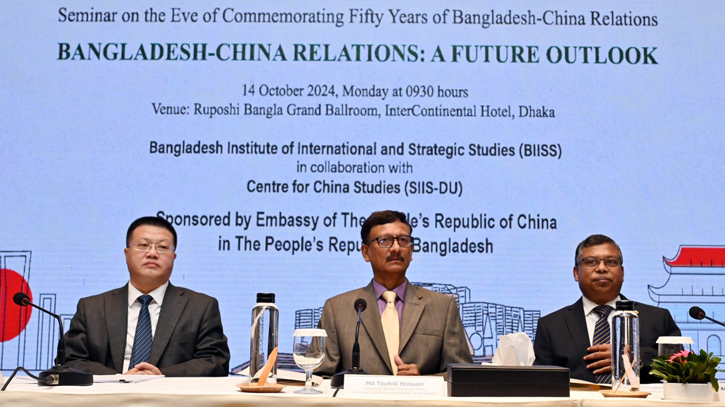
Photo: Collected
Foreign Affairs Adviser Md Touhid Hossain on Monday said as Bangladesh has witnessed the most significant political change in its national history, the future of Bangladesh-China relations in a post-revolution setting requires a more comprehensive approach.
"It is likely that the post-revolution trajectory of Bangladesh and its future relations with China might be influenced by various factors, including Bangladesh's political stability, and the changing dynamics of regional and global politics," he said.
The adviser made the remarks while speaking at a seminar on "Bangladesh-China Relations: A Future Outlook" at InterContinental Hotel in Dhaka.
Chinese Ambassador to Bangladesh Yao Wen and experts from both sides spoke at the seminar.
Although the future of bilateral ties between Bangladesh and China can be shaped by several factors, Adviser Hossain said, the core elements of cooperation such as aspects of trade and investment, infrastructure development, and technology sharing need to endure, since these aspects are propelled by mutual interests in economic advancement and regional stability.
In the coming days, he said, along with focusing on the core elements, both countries can also expedite meaningful collaboration on several other emerging areas such as green energy, tourism, satellite technology and climate change.
Also, to devise a mutually beneficial future outlook of the bilateral ties between the two countries, new avenues of collaboration need to be explored by both sides, he said.
"I believe the exchange of ideas will help us more to understand how the future course of the bilateral relations between the two countries will evolve in the midst of evolving internal, regional and global dynamics," Hossain said.
He also talked about how this bilateral cooperation can contribute in reorienting Bangladesh's post-revolution economic trajectory, and how this bilateral cooperation needs to advance in the context of the country’s changing political landscape.
Over the past years, since the establishment of diplomatic ties, the adviser said, China and Bangladesh have relentlessly valued each other as equals, pursued mutual benefits and advantageous outcomes.
Both countries, from the very beginning, supported each other on the matters of core interests, and worked together on the path to realizing their respective development, he said.
Hence, the Foreign Affairs Adviser said, the diplomatic ties between Bangladesh and China set an example of amicable coexistence and cooperative success.
Hossain said Bangladesh is keen to strengthen both its economic and security ties with China along with deepening collaboration in several critical areas including clean energy and infrastructure development.
Bangladesh Institute of International and Strategic Studies (BIISS) and the Centre for China Studies (SIIS-DU) jointly organised the seminar.
The two countries are looking forward to celebrating the 50 years anniversary of the establishment of diplomatic relations.
China is an important partner in the modernization of Bangladesh’s military while Bangladesh looks forward to further cooperation particularly in the military training programmes.
Hossain said enhanced defence cooperation could play in increasing Bangladesh's involvement in United Nations peacekeeping operations, which remains a key priority for the country.
The adviser pointed to infrastructure development as another area of potential collaboration with China, stressing the need for sustainable projects.
"We welcome further cooperation in infrastructure development and energy projects, particularly in green energy,” he said, emphasizing on completing projects on time.
The Foreign Adviser highlighted China's role in the ongoing efforts to resolve the Rohingya crisis, stressing that the only viable solution involves the safe repatriation of the Rohingyas to their land of origin in Myanmar.
"We appreciate China's cooperation, but unfortunately, the trilateral dialogue has not yet succeeded in returning even one Rohingya (in the last seven years)," he said.
Chair of the Committee on White Paper on the State of Bangladesh's Economy, Dr. Debapriya Bhattacharya, was present as special guest at the event.
Director of the Academic Advisory Council, SIIS Professor Dr. Yang Jiemian made a special remark at the inaugural session.
BISS chairman Ambassador AFM Gousal Azam Sarker presided over the inaugural session while director general Major General Iftekhar Anis gave the welcome speech.
In his remark, the Chinese Ambassador said Bangladesh has recently experienced significant political transformations and is now at a critical historical juncture.
“As a comprehensive strategic cooperative partner, China firmly supports the interim government in its endeavours to state reforms, maintaining law and order, promoting economic development, and improving the livelihoods of the people,” he said.
Referring to his recent interactions with Bangladesh's interim government, political parties, and various sectors of society, the envoy said he witnessed firm commitment from Bangladeshi people to China-Bangladesh friendship and their support for developing bilateral relations.
“They believe that our two countries are now facing significant historical opportunities for deeper cooperation,” he said.
The Ambassador said China supports Bangladesh in becoming a partner country of the BRICS mechanism and a dialogue partner with ASEAN.
“China is willing to contribute to the repatriation of the Rohingyas and work closely with Bangladesh on international and regional affairs, strengthening coordination and cooperation within the United Nations and other multilateral frameworks,” he said.
Dr. Debapriya Bhattacharya urged Chinese companies to invest in the Chinese Economic and Industrial Zone (CEIZ) in Bangladesh. He emphasized that such investments are essential to making the Karnaphuli Tunnel economically viable and its role as a catalyst for enhanced economic cooperation between Bangladesh and China.
There were three working sessions in the seminar.
The first working session titled "The Impact of Bangladesh's Changing Political Landscape on Regional Dynamics" was moderated by former Foreign Secretary Ambassador Farooq Sobhan.
The second working session titled "Bangladesh's Political, Economic, and Social Reforms and the Trends" was moderated by Associate Research Fellow, Academy of Contemporary China and World Studies Dr. Zhang Jiuan.
Dhaka University’s International Relations Professor Amena Mohsin moderated the third working session titled "Strengthening China- Bangladesh Cooperation and Advancing the Comprehensive Strategic Cooperative Partnership."
Messenger/Fameema








